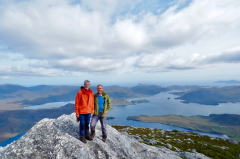Bob Brown, the celebrated activist and author, has talked the talk for more than four decades, and continues to walk the walk. Most recently, 79-year-old Brown was arrested and found guilty in August 2024 of trespassing in connection with an anti-logging protest in Snow Hill, Tasmania, in which Brown and fellow activists sought to protect critically endangered Swift parrots and their habitat. The prospect of a custodial sentence did not deter Brown from continuing his fight for the environment. “They can jail us, but they can’t lock up our spirit for the planet or love of the Earth and love of life,” says Brown.
It isn’t the first time that Brown has faced prison time. In 1983, Brown was arrested while protesting the construction of the Franklin Dam on the Gordon River in Tasmania. Brown spent 19 days in Hobart’s Risdon Prison, and on the day of his release was elected to Tasmania’s parliament. Thanks to the efforts of Brown and his fellow activists, the campaign against the construction of the Franklin Dam was ultimately successful, and the proposed dam was never constructed.
While Brown may have avoided further jail time in respect of the recent trespassing charges, he is acutely aware that environment activists in other parts of the world frequently face much harsher consequences than activists in Australia. The challenges faced by activists in other countries are to be a topic in a new book that Brown is currently working on, to be titled Defiance, which is a follow up to his 2015 book, Optimism. “I’ve just finished a chapter alluding to the fact that 200 or 300 environmentalists are murdered each year around the world,” Brown says. “We’ve got it pretty easy in Australia. I’ve just talked about Mia [Mascariñas-Green], the environmental lawyer in the Philippines, who was gunned down in front of her children. This is thuggery and violence versus planet saving and a wish for peace. I’m writing about the men and women who are living in dangerous countries like Colombia and Peru and Brazil and Mexico and the Philippines, and indeed China and Russia, that repress activists. Environmentalists just disappear in those countries. That’s something that we should be speaking about. The inspiration is those people living in much, much more dangerous circumstances who nevertheless won’t turn their back on the environment or their children’s right to a secure future planet.”
There is a clearly still a tremendous amount of work to be done to protect the environment and those people that fight for it globally. However, one positive is the change in public perception that Brown has witnessed in Australia over the past 30 years. Reflecting on how things have evolved since the early ‘90s, Brown says, “If I went up the street, I’d be threatened and sworn at with four-letter words and so on. I’d often take someone with me because people were very abusive. But, nowadays, it’s totally changed. People say to me: ‘Good on you, Bob. We’re right with you. Thank you, thank you, thank you.’”
I got to witness this first-hand in August 2024 when I saw Brown in conversation with Jan Fran at the Byron Writers Festival. When Brown was introduced at the event, he got a rockstar’s reception, with people clapping, cheering, whistling and stomping their feet. If anyone had wandered into the room at that moment and witnessed the borderline hysteria, they could have been forgiven for assuming that Mick Jagger was making an appearance, as opposed to an environmentalist and former politician. When Fran pondered how she might best describe Brown, she was inundated with suggestions from the audience, with shouts of “national treasure”, “icon” and “living legend”.
Brown was at the Byron Writers Festival to discuss his latest book, Thera, which is a young-adult novelette featuring environmental philosophy presented in the form of a love story. Thera, an anagram for Earth





